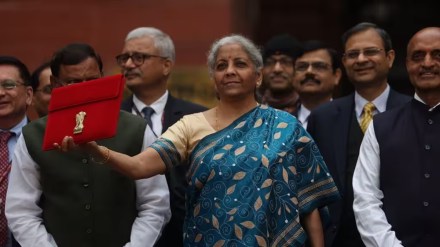Budding entrepreneur Anuja Bhattacharjee desires for an inclusive budget, one where voices of the young are heard and aspirations considered, along with a promising future for startups in India. Sharing her wishlist to empower young entrepreneurs, the 28-year-old said: “There have been sustained efforts to address youth-specific needs but the government should continue to allocate funds to the Startup India Seed Fund Scheme to support early-stage startups, besides a decent budget allocation for investment in skill development.” The Guwahati resident started a digital marketing and consultancy firm in 2019 after failing to secure a government job.
Sarthak Bhadkamkar, a tech graduate from Manipal Institute of Technology in Karnataka, feels there have been significant improvements in digital infrastructure but sustained job creation remains a concern for his generation. “I hope the budget will prioritise the startup ecosystem,” said Bhadkamkar (22).
“Simple measures like curbing the dual tax on ESOPs could boost the sector, incentivising entrepreneurs and professionals. This way the government can unlock India’s high growth potential and secure a vibrant future for the youth,” added Bhadkamkar.
Ayush Kumar, a 22-year-old intern at SAP Labs, Bengaluru, said, “The budget must focus on the global supply chain of specialised and high-priority tech sectors like semiconductor fabrication, promote innovation in areas conducive to creating high-skilled workers in future, which will pave the way for a lucrative economy driven by young people.”
Arushi Gandhi, an entrepreneur in residence at Antler, a Singapore-based early stage investor, wants easier regulations, tax breaks, and more funding for startups. “Support for female entrepreneurs with funding, mentorship, and training would be good. Women have been under-funded for too long. Previous initiatives like the PLI scheme, GST rate reductions, and the Digital India initiative make a big difference to empower young entrepreneurs like me,” Gandhi said.
Since the benefits from previous budgets gave access to loans through the Mudra Yojana, helping many women start their own businesses, Sonali Rani, an e-commerce manager working in electrical and energy sector in Mumbai, wishes for enhanced financial support for women-led businesses. “We must expand healthcare coverage and affordable medical services, more scholarships and incentives for women in higher education and professional courses. Stronger enforcement of workplace laws for gender equality and support for working moms are needed, because equality shouldn’t just be a buzzword,” said 28-year-old Rani.
Fuelled by strong domestic demand, the travel and tourism sector eyes sustained focus on improving road, rail and air connectivity to boost tourism. Ritesh Agarwal (30), founder & CEO, OYO Hotels and Homes, said: “The government’s infrastructure push, evidenced by initiatives such as Swadesh Darshan and PRASAD, is poised to transform the industry. Rural tourism, which remains largely untapped, can stimulate local economic growth. We urge the government to incentivise states to accord industry status to tourism. This will lead to the mushrooming of more sub-sectors, encouraging investment.” He added that introduction of a services-linked incentive scheme for industries in the sector would act as a catalyst for employment and catapult Indian businesses to the global stage. “As travel and entrepreneurship both boom in India, it is important to incentivise founders with such benefits,” said Agarwal.
The current pool of candidates fall short of meeting the surge in demand in the hospitality sector. “The government must escalate financial support for training initiatives within the hospitality domain and cultivate an employment landscape for youth. We also expect the GST rate on hotel accommodation services, currently set at 18%, to be reduced to 12% this year,” added Bhavik Sheth (32), COO of Evoke Experiences, a hospitality company crafting immersive experiences.
Building on the successes of Isro’s Chandrayaan and Aditya missions, the space sector is gaining confidence with FDI liberalisation. As a sunrise industry, more demand generation from the government is essential to drive non-linear growth, feels Arpan Sahoo, co-founder and COO of space-tech startup KaleidEO. “While current tax and customs exemptions benefit systems and subsystems, we need to extend these to component levels. This is crucial for startups operating with limited resources, allowing them time to scale over the next decade. Additionally, while the FDI policy is welcomed, it requires fine-tuning to address certain regressive ambiguities,” said the 32-year-old, adding, “The best support the government can provide is to act as a customer. Massive training programmes, awareness initiatives, and industry consultations are crucial at all bureaucratic levels. The industry still relies on imports for critical components and technologies, and ecosystem growth is hindered by a lack of capital for risk-taking R&D. While private funds offer some support, substantial government initiatives are vital for confidence. We expect a significant increase in budget allocation to support these needs.”
From space to soil, the agriculture sector needs measures to improve productivity through fertiliser subsidy allocation, and prioritise farmers’ welfare, feels Bengaluru-based BK Charan, a 27-year-old deputy manager with IndusInd Bank.
There is increasing anticipation regarding potential announcements among corporate executives. For instance, Mumbai-based Aparna Dubey, a 31-year-old brand manager in the BFSI sector, said long-term capital gains (LTCG) taxes should be removed. “There should be a structured plan to reduce inflation for people earning less than Rs 10 lakh a year. Digital earning avenues are highly unstructured. Some companies’ taxation system on advertising, marketing and sales promotion expenses are incurred over and above the industry average. This should change,” added Dubey.
